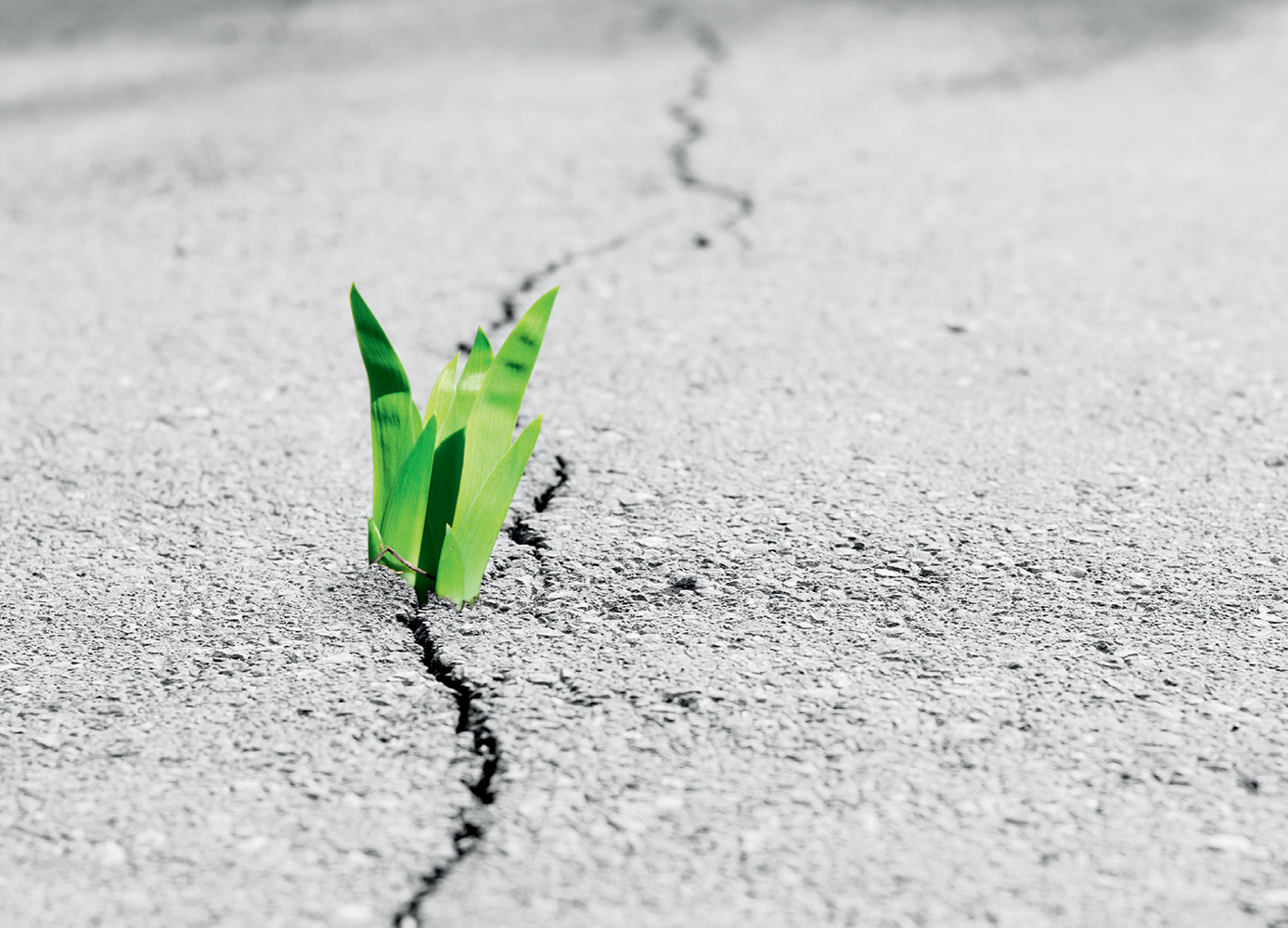If living in the days of COVID-19 is getting you down, you should know that you can develop and strengthen your ability to rebound from adversity
By Wendy Haaf
Photo: iStock/scyther5.
If you know someone who seems to maintain a positive outlook despite a life path littered with challenges, perhaps you considered that ability a personality trait that was, if not inborn, then fixed at an early age. Such psychological resilience was indeed once viewed in just that way, but researchers have since realized that we can in fact foster a capacity to bounce back after adversity.
“We’re looking at resilience as a dynamic process—as something that can be changed or supplemented with resources,” explains Theodore Cosco, an assistant professor of mental health and aging and a co-lead of the Canadian Longitudinal Study on Aging site at Simon Fraser University in Vancouver. Here’s how.
Cultivate Healthy Habits
Many of the things that help keep us physically healthy also appear to promote psychological resilience, says Carrie McAiney, the Schlegel Research Chair in Dementia at the Schlegel/UW Research Institute for Aging and an associate professor in the School of Public Health and Health Systems at the University of Waterloo (ON). “A lot of my research is in the area of dementia, and when people talk about trying to either prevent or live well with dementia, we talk about having a healthy lifestyle—eating well, exercising, and so on—and there’s the same idea with resilience, as well,” she says.
For instance, in a study that used data on 6,771 adults 65 or older (all participants in the Canadian Longitudinal Study on Aging) with two or more of 27 possible chronic conditions, better sleep was the top predictor of high psychological resilience, and second on the list (after low to normal body mass index) of factors linked with high overall resilience; these were followed by better appetite, fewer skipped meals, non-smoking status, and less inactivity.
“You’re saying, ‘I know,’” lead author Andrew Wister said during a presentation about the study at a June 2017 town hall on frailty and resilience at the University of Calgary’s Brenda Stafford Centre on Aging. (Wister is the director of Simon Fraser University’s Gerontology Research Centre). “But I don’t know if people know how important these things are—because they’re not doing them!”
Build and Protect Connections
In research using data from the British 1946 Birth Cohort, “we found that social support was associated with greater levels of resilience,” Cosco says. And both the quantity and quality of participants’ relationships seemed equally important. (Quantity includes not just the number of people in your social circle but how many contacts you have with them, while quality or closeness encompasses factors such as feeling you can confide in someone.)
Similarly, when researchers at St. Thomas University in Fredericton, NB, studied whether resilience was linked to storytelling narrative (the way people think about and relate events in their lives), they discovered that some people who scored low on resiliency tests were in fact very resilient, judging by interviews in which they related how they had dealt with challenges and changing life circumstances. The common thread in this subgroup was a sense of feeling part of something larger, be it a church, a family, or a community, explains Clive Baldwin, a professor of social work and the director of the Centre for Interdisciplinary Studies on Narrative at St. Thomas.
If you want to get more out of your exercise efforts, consider taking up activities that help build your social network while nurturing your physical and mental health. “Physical activity is associated with greater psychological resilience, and there can also be a social component,” Cosco says. And activities requiring concentration, such as tai chi or dance, can provide a mental distraction from problems. “Thus a walking group or exercise class can offer mental and social benefits,” Cosco says.
It’s also worth keeping in mind that meaningful relationships aren’t limited to those with other people.
“People have relationships with the natural world, flora, and wildlife,” notes Dr. David Hogan, the site principal investigator for the Canadian Longitudinal Health Study, academic lead of the Centre on Aging, and the Brenda Stafford Research Chair in geriatric medicine at the University of Calgary. Consequently, living in neighbourhoods with green space where it’s possible to enjoy that kind of connection can foster resilience. (Physical environment and the communities we live in are important in other ways, too, Hogan adds. “Is it a neighbourhood where we feel comfortable walking? Are there places to walk to, such as stores or movie theatres?”)
Pursue Purpose and Meaning
“In order to weather storms, to survive life, we need things like hope and love and peace and joy,” says Jane Kuepfer, the Schlegel Specialist in Spirituality and Aging at Conrad Grebel University College in Waterloo, ON. And studies have linked a sense of purpose and meaning with better mental and self-perceived physical health, and even greater longevity in older adults. Kuepfer defines things that meet these deep human needs as spiritual resources.
“They can be all sorts of things,” she says. “For some people, religion is a very strong spiritual resource. Sometimes, it’s a person’s belief that gives them hope. It could be children and grandchildren—seeing hope for the future through them. It might be growing things; it might be volunteering and connecting with organizations in the community that are doing good things, or it might even be donating money,” she adds.
A reason for getting up in the morning can even come in the form of a furry friend, says Ann M. Toohey, the scientific coordinator of the Brenda Stafford Centre on Aging and an adjunct assistant professor of community health sciences with the O’Brien Institute for Public Health and the Cumming School of Medicine at the University of Calgary. For some of us, she says, a relationship with a pet or companion animal “is a way that people can feel their lives have meaning and they’re doing something with purpose.”
Plan Ahead
Strategies that help us compensate for the biological consequences of aging—such as being proactive rather than reactive and planning for predictable events—also help shape resilience, according to Candace Konnert, an associate professor of psychology and the director of the Healthy Aging Laboratory at the University of Calgary.
“What do we know from the research literature?” she asked in a talk at the town hall on frailty and aging mentioned earlier. “First of all, people don’t plan, other than financial planning. People go through life with unrealistic optimism—bad things happen to other people, but they don’t happen to me. We also know from the research on stress and coping that it’s better to be proactive rather than reactive.” This can mean such things as anticipating the possibility that you might have to give up driving at some point and moving to an area with reliable and affordable public transit. “The call is really for a more realistic optimism in terms of thinking about the future and our future aging,” she says.
Forge New Brain Circuits
What if you find it difficult to maintain an optimistic outlook because your emotional reactions to stress drag you down? Believe it or not, you can develop resiliency by changing your thoughts and behaviours—and that doesn’t mean simply adopting a Pollyanna-like attitude.
For instance, learning to short-circuit unhelpful self-talk patterns via a course of cognitive behavioural therapy (CBT) has a success rate similar to medications for treating depression and has also been shown to reduce the risk for recurrence. And studies have found that, over time, CBT and mindfulness meditation actually change the brain, dialing down activity in the amygdala (the brain’s fear centre, which is trigger-happy in people prone to depression) and increasing activity in the prefrontal cortex, which is responsible for complex mental tasks such as self-control and planning. It’s thought that this translates into the ability to momentarily take a step back and reassess rather than react emotionally in a knee-jerk manner, and that may enable you, for example, to reframe an event as an opportunity for growth and learning rather than a hardship or calamity.
Another strategy that may have a similar effect is writing about your life to improve self-understanding. In a preliminary study involving 16 older adults, scores on validated questionnaires for measuring resilience, mastery, psychological well-being, and narrative foreclosure (essentially the sense that life is over and doesn’t hold any new chapters) changed little after three workshops in life-writing; however, “people who were new to writing got quite a lot out of it,” St. Thomas’s Clive Baldwin says. “They felt more positive about their lives, and they had more of a sense of generativity—of passing on a legacy, of thinking, I want to write this because I want my grandchildren to know about me.”
When looking back over your life, you might very well realize that you’re more resilient than you think. For instance, there’s evidence that life review therapy—going over the pivotal events in your life and the kinds of strategies you used to cope—helps reduce symptoms of depression and anxiety. “One of the things we do as clinical psychologists is to remind people of compensatory strategies they have used but don’t remember because they’re depressed or anxious,” Konnert explained at the town hall on frailty and resilience.
Advocate for Social Change
Finally, “there are collective and social resources that influence resiliency,” Toohey says, from old-age pension and community programs such as Meals on Wheels to age-friendly policies and accessible housing design.
“One of the things that the Centre on Aging promotes is interdisciplinary approaches to improving the lives of older adults through research and training,” she says. “Resilience is a concept that requires multiple efforts and many different people improving the world that we are aging in.”
Or, as Michael Ungar, Canada Research Chair in Child, Family, and Community Resilience and a professor of social work at Dalhousie University put it in a May 2019 Globe and Mail essay adapted from his book Change Your World: Resilience and the True Path to Success (Sutherland House, 2019), resilience is not a DIY endeavour.
“The science of resilience is clear,” he writes. “The social, political, and natural environments in which we live are far more important to our health, fitness, finances, and time management than our individual thoughts, feelings, and behaviours.” Furthermore, healthy resilient communities “are largely a consequence of good governance and progressive taxation, housing, and social welfare policies.”
And if doing what we can to move things forward on these issues doesn’t directly benefit us, it should contribute to a better, more resilient future for our kids and grandkids.






